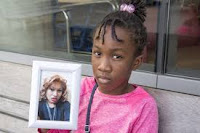Executive Director - Euthanasia Prevention Coalition
 |
| The daughter of Taquisha McKitty |
On June 26 Ontario Superior Court Justice, Lucille Shaw, ordered that McKitty was to have the Life-Support withdrawn in a month.
McKitty's family appealed the decision, last Thursday, preventing the removal of life-support and challenging the brain death designation.
Reporting for the Brampton Guardian, Marco Chown Oved outlines the reasons given for the appeal. According to Hugh Scher, the lawyer for the McKitty family:
...Justice Shaw erred “by applying a legal definition of death that fails to conform with a biological definition of death.”
...the court further erred by not allowing independent experts to videotape or assess McKitty’s movements, which “differ in nature, quality and duration from spinal cord reflexes.”
Shaw’s ruling stated that the Charter of Rights and Freedoms does not apply to McKitty, because it only protects “persons,” and McKitty, because she is clinically brain dead, is not legally a “person.”
This puts the cart before the horse, Scher argues in the appeal, because McKitty’s Charter rights were breached in order to pronounce her dead.
“The Court’s predetermination of Taquisha’s death to justify non-application of the Charter of Rights and Freedoms ... dehumanizes Taquisha as a non-person from the outset,” Scher wrote. “Taquisha is an individual under the law deserving of Charter protection.”
 |
| Hugh Scher |
In her decision, Justice Shaw also focused on financial reasons for withdrawing treatment from McKitty. Scher stated in an interviewed by CBC news in May 2018 that:
"It (the case) raises a serious question as to what is death in Ontario and in Canada. There is no statutory legal definition," said Scher on Metro Morning Tuesday. "We're hopeful this case will provide some guidance."
Scher and the McKitty family say that beyond breathing and having a heartbeat, Taquisha shows other signs of life — like moving her legs — that prove she's still biologically alive.
"She eats, she drinks, her organs function," said Scher, comparing her to "many other people with a severe neurological impairment."The McKitty case questions whether a person, who has been declared brain dead, is actually dead.
Hugh Scher was also the lawyer in the Shalom Ouanounou case in Toronto.

No comments:
Post a Comment